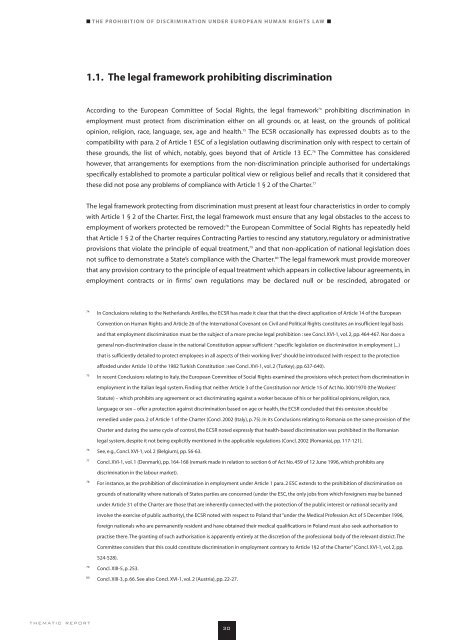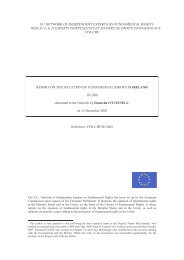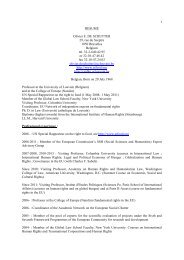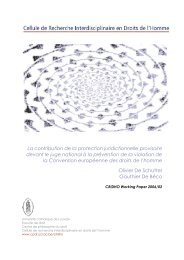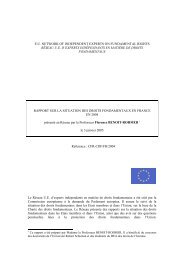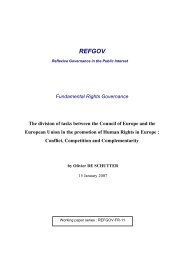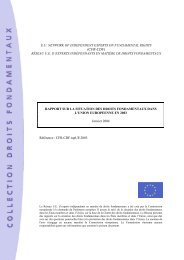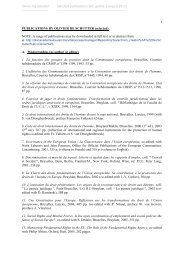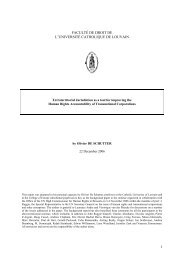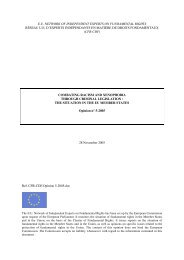The Prohibition of Discrimination under European Human ... - cridho
The Prohibition of Discrimination under European Human ... - cridho
The Prohibition of Discrimination under European Human ... - cridho
You also want an ePaper? Increase the reach of your titles
YUMPU automatically turns print PDFs into web optimized ePapers that Google loves.
thematic report<br />
■ THE PROHIBITION OF DISCRIMINATION UNDER EUROPEAN HUMAN RIGHTS LAW ■<br />
1.1. <strong>The</strong> legal framework prohibiting discrimination<br />
According to the <strong>European</strong> Committee <strong>of</strong> Social Rights, the legal framework74 prohibiting discrimination in<br />
employment must protect from discrimination either on all grounds or, at least, on the grounds <strong>of</strong> political<br />
opinion, religion, race, language, sex, age and health. 75 <strong>The</strong> ECSR occasionally has expressed doubts as to the<br />
compatibility with para. 2 <strong>of</strong> Article 1 ESC <strong>of</strong> a legislation outlawing discrimination only with respect to certain <strong>of</strong><br />
these grounds, the list <strong>of</strong> which, notably, goes beyond that <strong>of</strong> Article 13 EC. 76 <strong>The</strong> Committee has considered<br />
however, that arrangements for exemptions from the non-discrimination principle authorised for <strong>under</strong>takings<br />
specifically established to promote a particular political view or religious belief and recalls that it considered that<br />
these did not pose any problems <strong>of</strong> compliance with Article 1 § 2 <strong>of</strong> the Charter. 77<br />
<strong>The</strong> legal framework protecting from discrimination must present at least four characteristics in order to comply<br />
with Article 1 § 2 <strong>of</strong> the Charter. First, the legal framework must ensure that any legal obstacles to the access to<br />
employment <strong>of</strong> workers protected be removed: 78 the <strong>European</strong> Committee <strong>of</strong> Social Rights has repeatedly held<br />
that Article 1 § 2 <strong>of</strong> the Charter requires Contracting Parties to rescind any statutory, regulatory or administrative<br />
provisions that violate the principle <strong>of</strong> equal treatment, 79 and that non-application <strong>of</strong> national legislation does<br />
not suffice to demonstrate a State’s compliance with the Charter. 80 <strong>The</strong> legal framework must provide moreover<br />
that any provision contrary to the principle <strong>of</strong> equal treatment which appears in collective labour agreements, in<br />
employment contracts or in firms’ own regulations may be declared null or be rescinded, abrogated or<br />
74<br />
75<br />
76<br />
77<br />
78<br />
79<br />
80<br />
In Conclusions relating to the Netherlands Antilles, the ECSR has made it clear that that the direct application <strong>of</strong> Article 14 <strong>of</strong> the <strong>European</strong><br />
Convention on <strong>Human</strong> Rights and Article 26 <strong>of</strong> the International Covenant on Civil and Political Rights constitutes an insufficient legal basis<br />
and that employment discrimination must be the subject <strong>of</strong> a more precise legal prohibition : see Concl. XVI-1, vol. 2, pp. 464-467. Nor does a<br />
general non-discrimination clause in the national Constitution appear sufficient :“specific legislation on discrimination in employment (...)<br />
that is sufficiently detailed to protect employees in all aspects <strong>of</strong> their working lives” should be introduced (with respect to the protection<br />
afforded <strong>under</strong> Article 10 <strong>of</strong> the 1982 Turkish Constitution : see Concl. XVI-1, vol. 2 (Turkey), pp. 637-640).<br />
In recent Conclusions relating to Italy, the <strong>European</strong> Committee <strong>of</strong> Social Rights examined the provisions which protect from discrimination in<br />
employment in the Italian legal system. Finding that neither Article 3 <strong>of</strong> the Constitution nor Article 15 <strong>of</strong> Act No. 300/1970 (the Workers’<br />
Statute) – which prohibits any agreement or act discriminating against a worker because <strong>of</strong> his or her political opinions, religion, race,<br />
language or sex – <strong>of</strong>fer a protection against discrimination based on age or health, the ECSR concluded that this omission should be<br />
remedied <strong>under</strong> para. 2 <strong>of</strong> Article 1 <strong>of</strong> the Charter (Concl. 2002 (Italy), p. 75). In its Conclusions relating to Romania on the same provision <strong>of</strong> the<br />
Charter and during the same cycle <strong>of</strong> control, the ECSR noted expressly that health-based discrimination was prohibited in the Romanian<br />
legal system, despite it not being explicitly mentioned in the applicable regulations (Concl. 2002 (Romania), pp. 117-121).<br />
See, e.g., Concl. XVI-1, vol. 2 (Belgium), pp. 56-63.<br />
Concl. XVI-1, vol. 1 (Denmark), pp. 164-168 (remark made in relation to section 6 <strong>of</strong> Act No. 459 <strong>of</strong> 12 June 1996, which prohibits any<br />
discrimination in the labour market).<br />
For instance, as the prohibition <strong>of</strong> discrimination in employment <strong>under</strong> Article 1 para. 2 ESC extends to the prohibition <strong>of</strong> discrimination on<br />
grounds <strong>of</strong> nationality where nationals <strong>of</strong> States parties are concerned (<strong>under</strong> the ESC, the only jobs from which foreigners may be banned<br />
<strong>under</strong> Article 31 <strong>of</strong> the Charter are those that are inherently connected with the protection <strong>of</strong> the public interest or national security and<br />
involve the exercise <strong>of</strong> public authority), the ECSR noted with respect to Poland that “<strong>under</strong> the Medical Pr<strong>of</strong>ession Act <strong>of</strong> 5 December 1996,<br />
foreign nationals who are permanently resident and have obtained their medical qualifications in Poland must also seek authorisation to<br />
practise there.<strong>The</strong> granting <strong>of</strong> such authorisation is apparently entirely at the discretion <strong>of</strong> the pr<strong>of</strong>essional body <strong>of</strong> the relevant district.<strong>The</strong><br />
Committee considers that this could constitute discrimination in employment contrary to Article 1§2 <strong>of</strong> the Charter” (Concl. XVI-1, vol. 2, pp.<br />
524-528).<br />
Concl. XIII-5, p. 253.<br />
Concl. XIII-3, p. 66. See also Concl. XVI-1, vol. 2 (Austria), pp. 22-27.<br />
30


